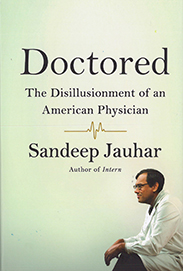AANS Neurosurgeon : Bookshelf
Volume 24, Number 2, 2015
A Physician’s Perspective on American Health Care: Disillusionment and Despair
Gary D. VanderArk, MD, FAANS
There is no question that many doctors in the United States are unhappy. Sandeep Jauhar, MD, an Indian immigrant, has joined the ain’t-it-awful crowd and written a book about our disillusionment, deception and despair.
In “Doctored: The Disillusionment of an American Physician,” he rightfully bemoans the waste in American health care and fails to see any transformation from volume to value. He observes that “when doctors are paid piecework for their services, the result too often is waste, disorganization, and overload.”
Jauhar is a non-interventionist cardiologist at Long Island Jewish Medical Center. He is paid a salary that does not meet his family’s expenses so he sells himself to a pharmaceutical company giving drug lectures at $1,000 a pop or moonlights with a private-practice cardiologist, for whom he has no respect, to make ends meet. His experience at least gives him a guilty conscience. He complains that nothing influences physician behavior like hard cash and rationalizes that “in the end, we all practice a certain amount of deception to make it through our lives.” He even looks down at his brother, an interventionist cardiologist, who is willing to do procedures that he thinks are not indicated.
He gives the impression that every physician in private practice is a crook. All those years, I thought my practice was so successful because I delivered high-quality care. Jauhar, on the other hand, seems convinced that those of us in private practice, if not illegal, are at least immoral. The people who read this book are going to assume he is right since he seems so honest and forthright in describing his own family. He describes his father, an academic botanist, as overbearing, irascible and embittered. About his mother, he writes, “She often told us she wanted children to become doctors so that people would stand when we walked into a room.” No wonder he has such a negative attitude about life.
There are some good parts in this book. Jauhar’s end-of-life section is instructive. He says doctors ignore their patients’ wishes, order expensive, useless remedies and provide unwanted terminal care. I thought it was the patients who demand more care.
I also appreciated his observation that the doctor-patient relationship is in serious trouble. When doctors are unhappy, they produce unhappiness in their patients. He concludes that doctors never seem to acknowledge that the widespread burnout in our profession is in part due to the behavior of doctors themselves.
Anyone who reads this book will conclude that health care today is going downhill. There is no recognition that we are making progress. You would think that cardiology would be a particularly good field to illustrate the good things that are happening in health care. This book is selling like hotcakes. You don’t necessarily need to read it, but because your patients are reading it, you do need to understand its message. Give your patients a smile, a friendly word or a hug.
 Gary D. VanderArk, MD, FAANS, is the distinguished clinical professor of neurosurgery at the University of Colorado Health Sciences Center, Denver. He was the 2001 AANS Humanitarian Award recipient. The author reported no conflicts for disclosure.
Gary D. VanderArk, MD, FAANS, is the distinguished clinical professor of neurosurgery at the University of Colorado Health Sciences Center, Denver. He was the 2001 AANS Humanitarian Award recipient. The author reported no conflicts for disclosure.
One Comment
Comment on this Article
We welcome thoughtful comments from readers. Please comply with our guidelines.


A comment on the review rather than the book: Here is hoping that our Neurosurgery colleagues at least, and also practitioners of other specialties, would receive and believe the message of the review rather than that of the subject publication. I, as another “senior but still active neurosurgeon” would like to join Dr. VanderArk in urging our fellow neurosurgeons, especially the residents and younger practitioners, to see a brighter picture. While there are certainly some negative aspects to the Practice of Medicine in general, as well as Neurosurgery specifically, there are no other vocations nor locales (USA) that offer the levels of opportunity for personal challenge and economic reward as does our field. This reviewer exemplifies one who has has used these opportunities for a successful career in Neurosurgery as well as the opportunity to serve those who are not in our favored position as Neurosurgeons.
Report this comment